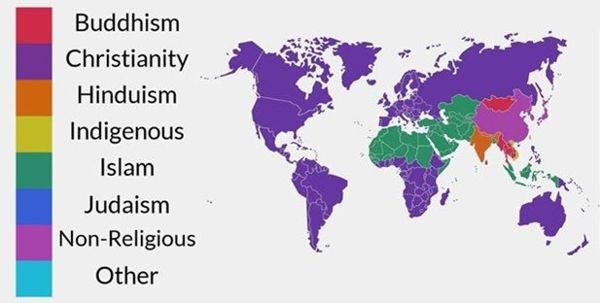
I prefer to use the simple phrase of “a search for God.” The secularists prefer the historical approach. They start with Hinduism in 2000 BCE coming forward to the Mormons, or the Church of the Later Day Saints in the 19th Century CE. They trace the religious experiences and traditions of the founders as carried forth and expanded into a discrete religion. The expansion depended upon military conquest, world trade, cultures, urbanization, and hierarchy.
The Eastern Religions tended to be more focused geographically, while the Western Religions spread rapidly over a much broader area. Some have formal scriptures, or religious guides, and others are more informal. The Egyptians had a strong naturalist religion that didn’t survive the empire. The Eastern religions of Buddhism, Jainism, Confucianism, and Taoism originated somewhere around the 6th to 7th centuries BCE. (These are not shown on the map.)
Three religions, Judaism, Christianity, and Islam, developed from the origin of Abram in about 2,000 BCE, or Abraham as he later came to be called. Christianity, split off from Judaism in the 1st Century CE, and Christianity split within a few hundred years into the Roman Catholic Church and the Orthodox Church.
A thousand years later, the Protestant Reformation started a division that over time splintered into hundreds of Protestant Denominations. Islam claimed a new founder in the 7th Century and grew in the Middle East. It now includes a large population in Indonesia.
The second approach is to describe how the world religions are divided around the globe. Today 27 countries have Islam as their official state religion. Christian countries vary between 9 and 13, depending upon whether it is just common practice or if it is official. Cambodia and Bhutan are officially Buddhist. India promotes Hinduism. Israel proclaims that it is a Jewish State. The Roman Catholic Church claim 1.3 billion members.
The third approach is to describe the impact of religions. Religion is a powerful force in the world today. It has been criticized for the so-called religious wars in prior centuries. Most wars in the 20th & 21st Centuries have been because of military conquest and civil unrest. The power of politics, greed, personal ambition, and human frailties are equally powerful. We can’t blame God anymore. We also have hospitals, universities, charities, and many other non-profit organizations focused on meeting human needs that originated with a religion organization.
A fourth approach is to describe religion in comparison with philosophy, politics, economic structures, etc. First, all religions have a set of beliefs, which we call theology. Most have a structured presentation of those beliefs, which we call scriptures. We have the Christian Bible, the Moslem Quran, etc. Even agnostics and atheists have a set of beliefs, usually expressed in negative terms.
Religion emphasizes the world of the Spirit. Hinduism is perhaps the most unstructured with a simple set of principles, such as peace of mind. They have an administrative structure. The Roman Catholic Church has the most rigid hierarchy that was copied from the Roman Empire and enlarged. Philosophy is more of a description of a mindset or ways of thinking. Politics is another word for the practice of governing. Economics can be summarized with one word: money.
When people say they are for or against religion, they usually mean a building or house of worship. They say they don’t worship anything other than perhaps the God of Mammon. Obviously, we have many words and concepts of who or what God may be. That’s why we have so many religions.